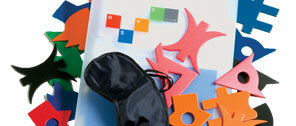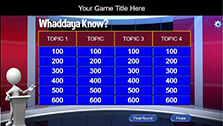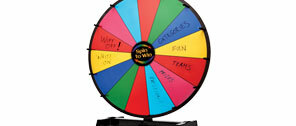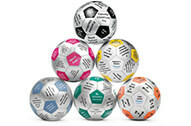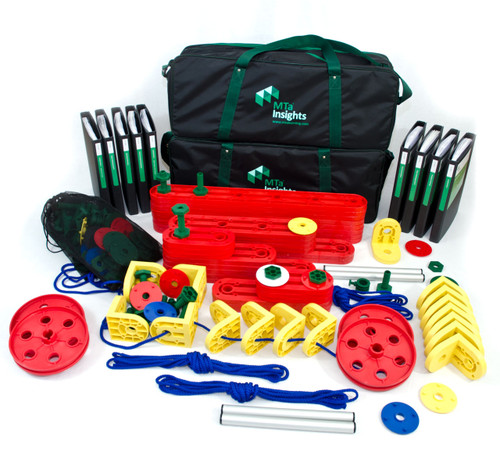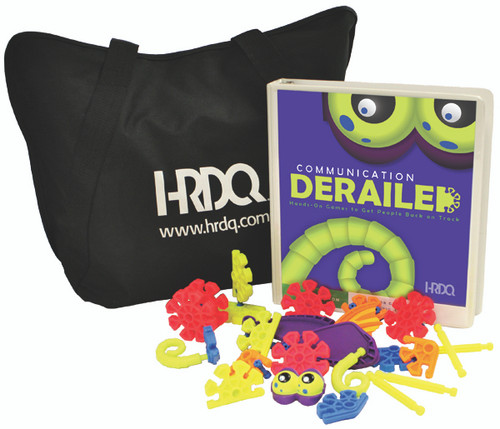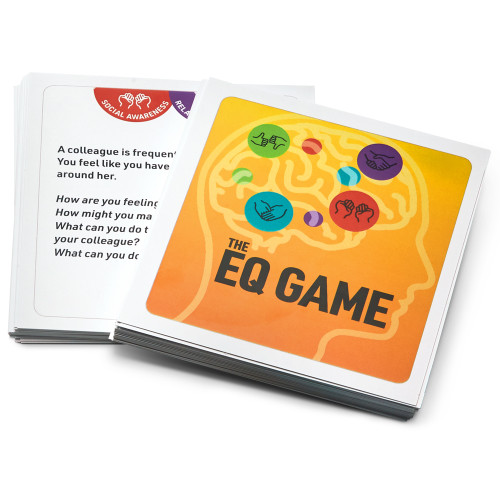Gather Insight and Experience with 53 amazing experiential games! That's only $68 per game!
This incredible kit is loaded with game parts and notes for 53 highly effective experiential activities provide participants with a broad range of learning opportunities. Each learning game comes with amazing facilitation notes, participant briefs, review questions, and learning reinforcement sheets.
*Please allow up to 2 weeks for shipping
- Easy game selection– games are categorized by focus and learning objectives so you choose the right corporate learning game for your group’s needs
- Clear facilitation notes– comprehensive notes make it easy for trainers and managers to lead each game
- Engaging experiences – developmental games are so engrossing that participants will get lost in the activity
- Insightful learning reviews – facilitate lively and thought-provoking discussions
- Real life learning – link experiences back to real work issues
FEATURES
- 53 activities – choose from a huge library of active learning games
- 240 game pieces – packed into two smart travel bags
- 9 binders – full of facilitation notes
- 10 minutes to 3 hours – make the most of however much time you have
- Introductory to advanced – engage anyone in your organization from apprentices to executives
- 5 to 20 participants per kit
TRAINING DEVELOPMENT GAMES
- Team Development (18 games)
- Problem Solving (6 games)
- Communication (7 games)
- Leadership
- Decision Making (6 games)
- Stakeholder Alignment
53 GAMES -- FOR ALL YOUR CORPORATE DEVELOPMENT NEEDS
** SEE GAME DESCRIPTIONS BELOW **
18 Team-Building Games and Activities
Introduce and develop the skills, abilities and attitudes frequently associated with effective team dynamics. Deepen and broaden individuals’ understanding of effective team working, whether groups are forming, storming, norming or performing. Team effectiveness qualities include:
- Listening
- Building on ideas
- Planning
- Questioning
6 Problem-Solving Experiences
Help participants understand the key elements of effective problem solving and the perceptual, emotional, cultural, as well as the intellectual blocks that might inhibit performance by individual team members. Develop skills such as:
- Problem identification, analysis and resolution
- Questioning self and others
- Success orientation
Communication (7 activities)
Effective communication, verbal and non-verbal, requires practice, feedback, and listening. These communication games will help you develop smart attitudes and behaviors that support effective communication:
- Succinctly explaining
- Effective instructing
- Unambiguous language
Performance Improvement & Negotiation Skills (6 activities)
This set of performance improvement activities encompasses a range of more complex leadership and team performance skills. These intellectually demanding activities will challenge your groups, and help you develop the attitudes and attributes required of top performers, such as:
- Followership and leadership
- Negotiation
- Strategic awareness
Leadership 1, 2 & 3 (4 long activities and 5 short activities)
The leadership games and activities in the MTa Insights Kit will help you develop those who are already effective team players into effective organizational leaders. Each activity provides opportunities for participants to experience different aspects of leadership and consider how the leader’s approach affects their followers. For instance:
- Gaining commitment
- Delegating
- Setting targets for others
- Styles of leadership
- Project management
Business Priorities (7 activities)
People and organizations are most successful when they produce and deliver something of value to others. These 7 activities introduce this reality. While they vary in difficulty from relatively-simple to quite-demanding, each assists in the development of these skills:
- Business acumen
- Customer focus
- Selling (product or ideas)
SEE WHAT’S INCLUDED IN EACH GUIDE
- Comprehensive facilitator’s notes
- Participant briefs
- Thought provoking review questionnaires
- Learning transfer sheets
- Online access to review questions and learning transfer documentation.
INCLUDES
- 240 Insight parts in 2 smart travel bags
- Facilitator guides for 53 activities
- MTa user license
- MTa participant worksheet
GAME DESCRIPTIONS
| GAME NAME | FOCUS | SHORT DESCRIPTION | TIME | PARTICIPANTS | LEVEL |
| Artifacts | Business Priorities | Competing teams have to establish customer needs by questioning you the customer, find ways to meet these needs and make sales presentations. | 25 Minutes plus Review | 6 – 20 in two to four teams of 3 - 5 | Intermediate |
| Built to Design | Business Priorities | Teams design and build symmetrical trays. However there are set periods for group discussion and planning, and other periods for building. All team members must understand and implement the decisions that the team has made and respond to any deviations from the plans. Any failures in team communications, decision making and planning, or lack of commitment to the process become obvious to all very quickly, but overcoming resulting problems efficiently isn’t easy! | 20 Minutes plus Review | 8 – 15 in two or three teams of 3 – 5 | Intermediate |
| Container Freight | Business Priorities | The cost of shipping goods is dependent on the way they are assembled and the size of container that must be used. There is an infinite number of ways of packing the goods, but teams have to consider their options, create their structures and calculate the costs, which should, of course, be as low as possible. | 30 Minutes plus Review | 6 – 20 in two to four teams of 3 - 5 | Advanced |
| Disc Transporter | Business Priorities | Teams have to establish customer needs by questioning, you, the customer to find a way to meet these needs profitably and to make a successful sales pitch using a model to back up their proposals. | 35 Minutes plus Review | 4 - 12 in one or two teams of 4 – 6 | Advanced |
| Getting Ahead | Business Priorities | Competing teams make money by trading their components and selling products to the customer (you the facilitator). Each team has a similar store of raw materials, but different product ranges and therefore differing needs for raw materials. Participants have to work out the relative profitability of their products, trade raw materials with other teams, and negotiate payment for replacement raw materials. | 30 Minutes plus Review | 6 – 15 in three teams of 2 – 5 | Advanced |
| Money Matters | Business Priorities | Teams set up and run businesses that make money by producing square, rectangular, trapezoid and triangular holes. They have to keep track of finances and produce a financial statement. The facilitator is assisted by two group members, one working as a customer, the other a supplier. | 25 Minutes plus Review | 5 – 14 in one or two teams of 3 – 6 (plus the customer and supplier). With just one team the custome | Intermediate |
| Back to back | Communication | This task involves effective communication at two levels, within and between pairs. To be successful individuals must work effectively giving and receiving clear instructions, whilst the pairs must work together to produce a single product: everyone has to be fully involved. | < 20 minutes plus review | 8, but in addition up to 4 observers can be usefully employed | Intermediate |
| Blind Statues | Communication | Group members have to create simple structures that will enable them to move an object as far as possible. The task involves a planning and an implementation phase. During the implementation phase half of the members of each group have to wear eye-shades. | 20 Minutes plus Review | 6 – 24 in one to three groups of 6 – 8 | Introductory |
| Getting it Right | Communication | There are 3 stages: 1.four groups produce instructions for the assembly of four sections of a model 2.paired groups take turns to assemble a section and observe each other assembling 3.The whole model is completed by members of each group working to verbal instructions. | 30 Minutes plus Review | 8 - 12 working initially in 4 sub-groups of 2 or 3 - It is possible to use the activity with just 2 | Introductory |
| My Views | Communication | Individuals score as many points as they can by taking part in a relatively simple task. However, as the task proceeds they have to disclose information about themselves. The nature of this information is dependent on the decisions made and actions taken. | 20 Minutes plus Review | 4 – 20 in one to four groups of 4 – 5 | Intermediate |
| Seeing Red | Communication | This is a competitive task during which team members have to interact throughout. Everyone has to: develop a common understanding of the problem, communicate their ideas clearly, think logically together, implement agreed actions carefully, and keep each other updated with progress. All communication has to be verbal. The task has similarities with the task in the activity ‘Sorting Shapes’, but this one is much more demanding. The two tasks can be used sequentially. | < 30 minutes plus review | 4 - 12 people working in one or two teams of 4 - 6. | Intermediate |
| Sorting Shapes | Communication | This is a team problem solving activity with a definite end point. It requires effective communication, logic, patience, accuracy and co-operation. There is no construction involved. The task has similarities with activity 6 ‘Seeing Red’ but ‘Sorting Shapes’ is much easier. The two tasks can be used sequentially. | < 15 minutes plus review | 3 - 12 working in 1 or 2 teams of 3 – 6 | Introductory |
| Swinging | Communication | Two teams working in separate locations are interdependent. Both have to complete a task which, through effective written instructions, will enable the other to complete a second task. | 20 Minutes plus Review | 6 - 10 working in two groups of 3 - 5 | Intermediate |
| Leading from Afar | Leadership 1 | The activity is in two parts. The first five minutes is spent with leader and team members working in separate rooms. They then come together under the direction of their leader to complete a predefined model. If more than one team is involved competition can be introduced. | 20 Minutes plus Review | 5 or 10 in one or two teams of 4, each with a Leader (observers can be used) | Intermediate |
| Leading the Team | Leadership 1 | The leaders of one or two teams are given a series of tasks that have to be completed by their teams, as well as a confidential task that must be done by them alone. The pay that team members and the leader receive is affected by the decisions the leader makes and the successful completion of the task. | 30 Minutes plus Review | 8 - 12 in two groups of 3 – 5, each with a leader | Advanced |
| Led Jigsaw | Leadership 1 | The activity is in two parts. During the first five minutes, the team members work individually (supported if necessary by their leader) on their own section of a task. Subsequently, everyone works together under the direction of the leader to complete a 'jigsaw' that has a correct solution. If more than one team is involved competition can be introduced. | 30 Minutes plus Review | 5 or 10 in one or two teams of 4, each with a leader (observers can be used) | Intermediate |
| Led Statues | Leadership 1 | The leader(s) have to work through their teams to complete the task which needs careful work. There are different constraints on leaders and team members which demand excellent verbal communication between the leader and the whole team as well as individual team members. | 25 Minutes plus Review | 5 to 24 in one to three teams of 5 - 8 (1 leader per team) | Introductory |
| Taller Stack | Leadership 1 | Taller Stack is a competitive two part activity. Initially groups work to complete a task that requires some thought and planning, then fast teamwork. However, before they finish, group membership is changed, ‘formal leadership’ introduced and the activity restarted with additional constraints. | 20 Minutes plus Review | 4 – 20 in two to four groups of 2 - 5 | Introductory |
| Cable Car | Leadership 2 | Three sub-teams, each with their own team leader, work in separate locations on interdependent parts of the same task. The overall leader has to provide direction and support to all three teams at the same time. It is a challenging and dynamic role as new problems are never far away! | 1 - 2 hours | Oct-13 | Introductory / Intermediate |
| The Hoist | Leadership 2 | 2 teams work in parallel on a task which is 3 parts. Aim: to refresh and develop skills that are fundamental to team leadership, identifying, clarifying and working to objectives and priorities, developing and delivering instructions to others, motivating others to achieve a goal that may be at odds with their personal objectives and to understand the implications of not recognising and utilising the team members' abilities. | 2 - 3.5 hours | Aug-14 | Introductory / Intermediate |
| Maxi Market | Leadership 3 | Participants are exposed to common problems with project management in this two part activity. The written objectives are clear but the priorities less so. Only when participants recognise the importance of understanding and meeting the customer's needs can they begin to make progress by breaking the task into parts, allocating work and managing interfaces. Typically many mistakes are made in part 1 but, following a learning review, participants are much more effective in part 2. | 1.5 – 2.5 hours | May-14 | Intermediate |
| Waste Away | Leadership 3 | The challenging activity is in 3 stages, each with its own learning opportunities: Stage 1: Leaders work closely with their teams, interfering? Stage 2: New information is introduced. Leaders must make time to re-evaluate tasks with new information, and preparing others to lead on their behalf. Stage 3: The task involves new leaders leading new teams but, as much of the learning will build on the individual learning realised during Stages 1 & 2, and those areas where there is scope for further development, the detail will vary from group to group. | 2.5 - 3.5 | Aug-14 | Intermediate / Advanced |
| Disc Roll | Performance Improvement | Competing teams score points by setting themselves and achieving targets. Teams monitor their progress against the competition and revise their plans to help them achieve their goals. | 30 Minutes plus Review | 6 – 12 in two or three teams of 3 – 4 | Introductory |
| Everyone’s a Winner? | Performance Improvement | The decisions involved in completing the task are complex. Teams develop their strategy and select a leader, but each team’s strategy has to be implemented by individuals working alongside their competitors, not their colleagues. Leaders can discuss and develop their strategy with their teams at specified times and enter into discussions with competing leaders. There are opportunities for everyone to make and break agreements. | 50 minutes plus review | 8 – 20, two to four teams of 3 or 4, with 1 leader per team | Advanced |
| Leading Pairs | Performance Improvement | The decisions involved in completing the task are complex. Pairs work to develop their strategies which have to be implemented by individuals whilst working alongside their competitors, not their colleagues. Pairs can discuss and develop their strategy at specified times during the activity but as they are unlikely to achieve similar results, tensions can develop. There are opportunities for everyone to make and break agreements. | 50 minutes plus review | 8 – 12 in four to six pairs | Advanced |
| Meeting Expectations | Performance Improvement | Teams plan the assembly of simple products (in difficult circumstances) and prepare financial forecasts. Each has 3 attempts to improve its profitability and the accuracy of its forecasts. Time constraints are tight and penalties harsh. Forecasts vs. actual costs are compared and their significance reviewed. | 50 minutes plus review | 4 – 12 or possibly 24. Two teams of 4, 5 or 6 are ideal, but 3 or 4 teams can work in parallel, but | Intermediate |
| Meeting the Challenge | Performance Improvement | Opposing teams score points by setting each other challenges which opponents may choose to accept or decline. The scoring system means that teams have to weigh up the likely impact of several variables. Teams can revise their approach and plans to meet changing circumstances. | 50 minutes plus review | 3 – 10 in one or two teams of 3 to 5 | Advanced |
| Our Success | Performance Improvement | There are three parts to the activity. Pairs or threes work within a group to achieve the highest score they can for their pair or three (not the group). The rules for scoring are different in different parts of the activity. Decisions within the pairs/threes are based largely on individuals’ approaches to, and understanding of, success when working with and in competition with others. With 8 or more people two groups work in parallel. This introduces additional dynamics which increase the learning opportunities. | 40 minutes plus review | 4 – 12 working in pairs (ideally) or threes in One or two groups of 4 to 6. Members of each pair / t | Intermediate |
| Colourful Necklace | Problem Solving | Teams are competing against each other to complete a task that appears simple (making a necklace that will encircle the whole group). However team members soon find it needs creative problem solving, care in planning and quality checks when executing the task. Constraints within the task make it much more challenging than it first appears. | 10 - 15 Minutes plus Review | 6 – 20 in two to four teams of 3 - 5 | Introductory |
| Girders | Problem Solving | Individuals or pairs work to solve a series of problems that involve arranging 6 similarly sized girders so that they have specified numbers of contact points. The initial problems are relatively easy, but they get more challenging as participants proceed. | 15 Minutes plus Review | 1 - 4 working individually, 4 - 8 in pairs or 9 - 12 in threes | Introductory |
| Jigsaw | Problem Solving | The activity is in two parts. During the first five minutes, team members prepare for the task on their own; they then come together to pool their resources to complete a jigsaw. | 20 - 25 minutes plus review | 4 or 8 in one or two teams of 4 | Intermediate |
| Odd Colour of Stack | Problem Solving | Competing teams have to stack from their components within specified constraints. The task is much more difficult than it appears: usually teams focus on the height of their stack instead of identifying and solving the major stumbling block which involves the colours of the components. Failure to identify and resolve this key problem can stop teams completing their task within the specified time | 10 Minutes plus Review | 6 – 16 in two to four teams of 3 – 4 | Intermediate |
| Through the Slot | Problem Solving | Competing teams score points by passing a tray though a frame. The greater the number of components carried by the tray and the greater relative size of the tray to the size of the frame, the higher the score. The problems the groups face are: understanding the implications of the brief, designing and building a tray and a frame that will attract as many points as possible, passing the tray safely through the frame. | 15 Minutes plus Review | 4 – 12 in one or two groups of 4 - 6 | Intermediate |
| Water Tower | Problem Solving | The task is to build a tower and use it to support cups of water within given constraints. The winning group is the one that completes the task in the fastest time, but there are penalties for errors so they must plan, group problem solve and work with care. | < 15 minutes plus review | 6 – 20 in two to four teams of 3 - 5 | Intermediate |
| Balancing Act | Team Building 1 | Teams compete to produce, within a tight time frame, the most accurate free standing weighing system from the materials provided. The winning team is the one that produces the system that is able to differentiate between the two most similar weights. | 15 minutes plus test and review | 6 – 12 in two or three groups of 3 – 4 | Intermediate |
| Boxed In | Team Building 1 | Teams compete against each other to make a functional object that can take almost any form. To avoid doing unnecessary and inappropriate work team members need to challenge assumptions and norms, make decisions that some may find hard to accept, and then work to appropriate quality standards. | <10 Minutes plus Review | 6 – 16 in two to four teams of 3 - 4 | Introductory |
| Enclosed | Team Building 1 | For teams to perform well they have to invest time in understanding the task and evaluating options before they start work. There are two activity briefs, one being significantly more challenging than the other. Each brief can be used in isolation, or they can be used sequentially to develop the learning further. | 5 - 10 Minutes plus Review | 6 – 20 in two to four teams of 3 – 5. | Introductory |
| Group Necklace | Team Building 1 | Teams compete against each other to complete a task. It appears to be simple but teams that dive-in find out that planning and attention to detail pays dividends. | 10 - 15 Minutes plus Review | 6 – 20 in two to four teams of 3 - 5 | Introductory |
| Odd Type of Stack | Team Building 1 | Competing teams have to build the shortest stack they can, using all their components within specified constraints. The task appears to be more difficult than it is because there is a critical objective and a secondary objective. The secondary objective usually takes precedence but is more difficult to achieve. Consequently, teams often miss the time deadline. | 8 Minutes plus Review | 6 – 16 in two to four teams of 3 - 4 | Intermediate |
| Shapes | Team Building 1 | The group has to make specific shapes from the components. Participants need to understand the problem, think logically and creatively, challenge norms and build on each other’s ideas. There are 3 levels of difficulty of the task in this activity: Option A is the easiest, Options B and C are more difficult technically. Because of the quantity of the components available in Option C, individuals can be tempted to work independently and reduce their team's performance. Options B or C can be used as a follow-on activity to Option A. | 10 - 15 Minutes plus Review | 3 – 20 in one to four teams of 3 - 5 | Intermediate |
| Short Thread | Team Building 1 | Teams compete against each other to complete a task that requires care in both its planning and execution. It’s apparent simplicity can cause problems if teams don't think ahead. | 8 Minutes plus Review | 6 – 16 in two to four teams of 3 – 4 | Introductory |
| Tall Stack | Team Building 1 | Each team has to create a stack using all of their components. The task isn't difficult but the constraints mean that thought, learning through experimentation and planning are all needed. When building the stack team members have to work together, supporting each other’s ideas and actions. | 10 Minutes plus Review | 6 – 20 in two to four teams of 3 - 5 | Introductory |
| Tightly Packed | Team Building 1 | Teams arrange their components so that they cover the minimum surface area. Successful teams will spend time understanding the task, looking for creative solutions and revising their ideas as they work. | 10 Minutes plus Review | 6 – 20 in two to four teams of 3 - 5 | Intermediate |
| Wheelbarrow | Team Building 1 | This is an energizing and fun activity during which competing teams have to build and use simple wheelbarrows, but will they be fit for purpose? They are tested in a race. | 15 Minutes plus Review | 6 – 12 in two to three teams of 3 - 4 | Introductory |
| Caught in a Web | Team Building 2 | 'Caught in a Web' is a more complex version of ‘Spinning your Web’. In it the actions of team A has a direct bearing on the success of Team B and vice versa. Each team has a dilemma: to win it has to outperform the other team, but both teams must complete the task before either can succeed. | 30 Minutes plus Review | 8 – 18 in two or three groups of 4 – 6 | Intermediate |
| DIY | Team Building 2 | Teams have to design and test tasks which are then ‘tried for real’ and evaluated. The activity has 6 phases: Task Design, Learning Review, Test 1, Review, Test 2, Review | 45 - 60 minutes including 3 short reviews | 8 – 14 in two groups of 4 – 7 | Intermediate |
| Feet of Clay | Team Building 2 | The group(s) have to develop a system of transporting a large marble as far as possible along a static human chain. There are constraints which challenge each individual and the teams. | 15 Minutes plus Review | 5 – 24 in one to three groups of 5 – 8 | Intermediate |
| Minefield | Team Building 2 | Each team has members on either side of a minefield. Team members on both sides have to work together to complete a task but they have to remain on their own side throughout. There are several ways that the task can be accomplished, but mistakes are penalised severely. Time spent planning, and the careful execution of these plans, is essential. | < 10 minutes plus review | 8 – 12 in two teams of 4 – 6 | Introductory |
| My Success | Team Building 2 | There are three parts to the activity. In each part individuals work within groups to achieve the highest score they can for themselves (not the group) by building stacks. The rules for scoring are different in each part of the activity. These differences raise questions about individuals’ approaches to, and understanding of, success when working with others. | 20 Minutes plus Review | 3 – 10 in one or two groups of 3 to 5 | Intermediate |
| Speedy Stack | Team Building 2 | Competing teams have to use all of their components to create the shortest stack they can. Teams work against the clock, but the task is complicated by constraints and time penalties for missing quality standards which create conflicting pressures, i.e. reducing time spent understanding and solving problems, planning and monitoring quality vs. getting the job done quickly. | 20 Minutes plus Review | 6 – 16 in two to four teams of 3 – 4 | Advanced |
| Spinning your web | Team Building 2 | ‘Spinning Your Web’ involves designing and building a structure that they then use in a competition. The two parts of the activity (designing and competing) are quite different so they generate quite different learning opportunities. | 15 Minutes plus Review | 8 – 18 in two or three groups of 4 – 6 | Intermediate |
| Successful Pairs | Team Building 2 | Small teams (pairs or threes) work to achieve the highest score they can for their team whilst working alongside competing teams. Co-operation between teams can increase their scores, but this will enable competitors to increase their scores as well. How do teams succeed when team members are likely to have very different personal attitudes to, and measures of, success? | 30 Minutes plus Review | 4 – 18 working in 2 to 6 teams of two (ideally) or three. Each team has to work alongside one or two |
Advanced |

